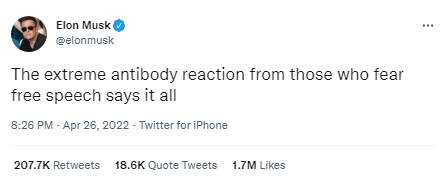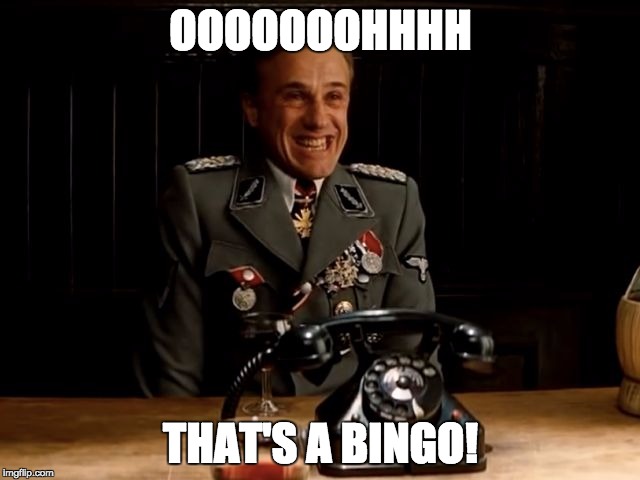We begin this post with two quick items before getting into our headline event.
First: last night’s Fredagsrock at Tivoli appears to have been a calm affair. Youngest attended with four friends: they were able to enter the park at about three in the afternoon, the crowd never got out of hand, and they enjoyed the Aqua concert. It’s good news for everyone, but bad news for my game theory experiment: clearly I missed a few variables beyond mere age.
Second: I’ve been openly struggling for years over what to call the politically leftist globalists running most of the western world right now. I’ve finally settled on what will henceforth be my term of choice: the Globalist Leftists, Oligarchs, and Billionaires—the GLOB (the link goes to an explainer piece).
We now return to our irregularly scheduled program, not yet in progress…
The international freakout over Elon Musk’s purchase of Twitter is more significant than I’d anticipated. As Musk himself observed:

“The extreme antibody reaction from those who fear free speech says it all.”
Anyone who’s been watching western political discourse for the past few decades knew the reaction was going to be an over-the-top and hysterical temper tantrum.
That’s the international left’s default defense and we see it all the time.
We get frothy rants and shakings of fists from the dingbats on cable television, raucous jeremiads in print and on the web, a hurricane of apoplectic posts on social media (usually with a brand new hashtag), some heated grandstanding from the political class (along with hysterical fundraising appeals from their campaigns), and weirdly emotional public statements signed by a few dozen self-identifying “experts.” These various hysterias bounce off one another for a few days, gradually taper off, and then we move on to the next Worst Thing Ever.
That’s the usual antibody reaction: sound and fury signifying nothing.
What we’re seeing with the reaction to the sale of Twitter is different because the GLOB seems genuinely alarmed by this development. More than alarmed: terrified.
I had thought I could limit myself to a few words on the importance of free speech, which is what I chose to focus on earlier this week.
That no longer feels adequate: the hysterical overreaction of the GLOB seems illustrative of a widespread misunderstanding (or deliberate and concerted distortion) of fundamental concepts like free speech, private property, and democracy. The overreaction in America is taking such a totalitarian turn that I can’t ignore it (the overreaction in the EU has also featured totalitarian impulses, but that’s standard operating procedure over here).
We’ll get to the American overreaction later, but let’s start by addressing the widespread misunderstanding (or distortion) of fundamental concepts. I’ve got a good example.
Taxpayer-funded DR reacted to Musk’s purchase of Twitter by broadcasting a panel discussion on Debatten (disclosure: I haven’t yet had time to watch the whole program), followed by an online Q&A compiled afterwards:
READ THE ANSWERS: “Some of us remember how uncomfortable debate on Twitter used to be”
DR.dk, Apr 28
The Q&A features questions from viewers and answers from three of the six panelists they’d had on the program (hosted as always by Clement Kjersgaard): Mikkel Bjørn Sørensen, a parliamentary candidate from the rightist Nye Borgerlige party; Mikkeline Thomsen, identified as a “partner at Analyse & Tal” (“Analysis and Numbers”); and Kasper Sand Kjær, the media director of Denmark’s governing leftist Socialdemokratiet party.
We’re going to skip straight to a portion at the very end of the Q&A
Viewer Morten R. Philipps asks, “What does this purchase mean for democracy?”
Mikkeline Thomsen answers: “More critical infrastructure in very few hands = less democracy.”
That terse response is the only answer provided. (Many questions elicited answers from two or three of the panelists.)
Two questions later, a user identifying him or herself only as “Frihed” (freedom), asks a question I’m going to translate a little loosely for purposes of clarity: “Mikkeline Thomsen, how can you say that the purchase of Twitter by someone who wants more free speech, from people who were and are apparently against free speech, produces less democracy?”
Thomsen answers: “Democracy means popular control. Not Elon Musk control. In a democracy the people have influence on who’ll be their leader and which rules and regulations they’ll live under.”
Taken together, her answers suggest that she understands almost none of the principles she’s discussing.
First: is Twitter “infrastructure?”
Here’s Oxford’s definition of infrastructure: “the basic physical and organizational structures and facilities (e.g., buildings, roads, and power supplies) needed for the operation of a society or enterprise.”
Is Twitter needed for the operation of anything? If it were necessary for the operation of our societies, it’s reasonable to ask how we made it from the stone age to 2006 without Twitter.
If the answer is that, like highways and airports, it wasn’t necessary until our societies came to depend on it, the next logical question is: where is the evidence that our societies depend on it? There are hundreds of millions of Americans and several billion human beings around the world who don’t even use it.
Certainly it’s an important communications platform, especially in the United States, particularly (and almost exclusively) for the political left, and it’s been (erroneously) compared to “the public square” even by people I generally respect and agree with. At the end of the day, however, it’s just one of many, many communications services available to anyone with a smart device and internet access.
If Twitter disappeared tomorrow, what actual difference would it make to the working of our world? Would grocery shelves be denuded of their goods? Would elections cease? Would parliaments and congresses dissolve? Would there be less food on your table, would your streets be less safe? Would dogs and cats begin living together?
I can tell you what would happen if airports, highways, power lines, seaports, bridges, or tunnels disappeared tomorrow. But I don’t need to tell you: your imagination can fill in all those blanks. Go ahead and ask your imagination what the world would be like if Twitter disappeared completely tomorrow.
My own imagination says there’d just be one less app on your phone (if you had it to begin with), and one less distraction in your life. “Hm, Twitter’s gone. Guess I’ll go over to FB or Insta or Snap to keep up. Or maybe I’ll get up off my ass and actually do something.”
Twitter also happens to be a private company. The left used to understand that: when conservatives groused about being shadow-banned, suspended, censored, or otherwise mistreated on Twitter, the typical leftist response was: it’s a private company, the first amendment doesn’t apply, if you don’t like it go build your own platform.
I don’t know that Mikkeline Thomsen ever made that argument: maybe she didn’t. But it’s actually a pretty good argument, and one that most rightists understood and agreed with, which is why the right more often argued about the problem of Twitter’s monopoly on whatever it is that Twitter does that’s so damn important.
So if you thought Twitter’s monopoly was a problem, the situation hasn’t changed with new ownership.
If you were okay with Twitter’s monopoly but objected to its strong leftist bias, manifest in its habit of silencing conservatives and suppressing stories that damaged the leftist narrative (a certain New York Post story comes to mind) then you probably welcome a change in ownership that appears to promise a more even-handed approach, or a more hands-off approach, to its “content controls.”
If you were okay with the monopoly bit because you were also okay with the squashing-of-the-right bit, then of course the change in ownership isn’t something you’re going to be happy about.
None of that has anything to do with infrastructure or democracy. It was never the ownership of Twitter that thrilled the left and annoyed the right: it was the policies of Twitter.
Ask yourself: if Elon Musk were an ardent leftist and shared the left’s various obsessions and fanaticisms, would anyone care that ownership of Twitter had passed from institutional investors into private hands?
Let’s keep all of the above in mind and move to her second answer, which is much more troubling:
Democracy means popular control. Not Elon Musk control. In a democracy the people have influence on who’ll be their leader and which rules and regulations they’ll live under.
Democracy in the strictest and most literal sense does indeed mean popular control: it means, as the old joke has it, “two wolves and a sheep voting on what’s for dinner.” It means the tyranny of the mob.
So Thomsen is correct so far: “democracy” literally means control by the people: they’re the demos in democracy.
And Elon Musk is not “the people,” so it’s also correct that “popular control” is not Elon Musk control.
And then Thomsen hits the trifecta: in her third sentence she says that “in a democracy the people have influence on who’ll be their leader and which rules and regulations they’ll live under.”
That’s correct for both the literal and figurative usages of “democracy.”
She’s three for three! How I can I possibly take exception to her answer, when I agree with each of the three individual sentences comprising it?
Because, like so much GLOB talk, it’s absolutely irrelevant.
The question had to do with how Musk’s ownership of Twitter could be bad for democracy when his stated purpose for doing so was to reduce the political censorship imposed by the current owners.
Thomsen’s answer is incoherent. Here’s her logic:
- Democracy means everybody has a say.
- Elon Musk is not everybody.
- Therefore, democracy is jeopardized if Elon Musk owns Twitter.
What sense does that make?
None.
Unless you believe that Twitter is, or controls, democracy.
And that, me hearties, is what the GLOB appears to believe. If it’s not what they believe, it’s certainly what they’re acting as though they believe.
Why would they believe that? Why would they act as though it were true?
Courtesy of Steven Crowder, here’s part of the answer in the form of a study out of Princeton University:
Our results indicate that Twitter lowered the Republican vote share in the 2016 and 2020 presidential elections, but had limited effects on Congressional elections and previous presidential elections. Evidence from survey data, primary elections, and a text analysis of millions of tweets suggests that Twitter’s relatively liberal content may have persuaded voters with moderate views to vote against Donald Trump.
So the GLOB may not necessarily believe that Twitter is democracy, or that Twitter controls democracy, but in the engine rooms of their political hackery they surely understand that Twitter can tweak democracy.
To the advantage of the left.
How much of an advantage? They actually quantify it:
We estimate that a 10% increase in a county’s number of Twitter users lowered the vote share of Republican presidential candidate Donald Trump by 0.2 percentage points (p.p.) in both the 2016 and 2020 presidential elections.
In other words: the more people use Twitter, the better for Democratic presidential candidates.
The GLOB is almost certainly reacting to a fear that the new management could nullify that advantage. They really do seem to believe that Twitter controls democracy because the GLOB believes that anything but Democratic Party control of the American government is innately undemocratic. (Speaker of the House Nancy Pelosi, in March, speaking of the 2022 midterms: “It is absolutely essential for our democracy that we win.”)
Let’s go back to the idea of misunderstanding (or misrepresenting) fundamental concepts.
In fact, “democracy” in the sense we have to assume Thomsen means it (conceptually rather than literally) is a set of values that includes (among many other things) the right to buy and sell things freely, to own things individually. It’s hardly an academic question: many a government has operated on the premise that individuals have no right to own anything, including their own labor, and history is cluttered with the gravestones of those governments. (And the graveyards of those countries are cluttered with the gravestones of the people those governments killed.)
Private property is indispensable to freedom, which is why the spiritual and philosophical heirs of Jean-Jacques “Spanky” Rousseau are so adamantly opposed to private property. You can’t be free without ownership of your own labor; owning your own labor means ownership of the things you barter your labor for: you work for a big company, they compensate you with currency that you can then trade for things that other people produced with their own labor, for a price you both agree on.
“Democracy” is obviously not the same as “Elon Musk control,” but it is conceptually the same as “Elon Musk’s right to own” (and of course he has the right to control what he owns—who else should?).
So what’s the GLOB to do? They can’t stop a legal business transaction without violating the very bedrock of this “democracy” they keep going on about.
Enter the Ministry of Truth—more accurately, the Disinformation Governance Board.
On Wednesday, DHS Secretary Alejandro Mayorkas announced at a House hearing the formation of a Disinformation Governance Board, which will carry the agency’s fight to a new front. The board will battle disinformation.

The link goes to a Politico article whose author, Jack Shafer, is skeptical of the DGB’s actual value but waves off the conservative reaction to the announcement of its creation as overheated. His primary argument is not that the DGB is a bad idea, or that the government has no business arbitrating what is and isn’t true (although he gets to those things eventually). It’s that the DHS is such a hot mess of bungling and incompetence that it’s not up to the job anyway.
Call it the Imperial Stormtrooper defense: “Who cares if they’ve just been given a thousand blasters? They’re terrible marksmen!”
More from Shafer:
Republicans like Sen. Josh Hawley of Missouri and conservative media like the Washington Times flipped out at the announcement, dusting off their Orwell and combing out their fright-wigs to warn of an impending DHS crackdown on not just free speech but free thinking. “This is dangerous and un-American,” Hawley said in a statement. “The board should be immediately dissolved.”
The board should indeed be immediately dissolved. It is dangerous. It is un-American. And it is even, dare I say it, undemocratic.
(Shafer gets around to acknowledging as much eventually, so it’s unclear why he wastes our time taking gratuitous swings at Hawley and the Washington Times. But forget it, Jake, it’s Politico.)
A single example will suffice: back in early 2020, the World Health Organization assured us all that the virus spreading in Wuhan, China, was not transmissible between humans. That was official information from one of the GLOB’s prized NGOs. It was authoritative. It was official.
Imagine if there had been a government agency in charge of “disinformation” at the time: they would have immediately cracked down on anyone suggesting that human-to-human transmission of the novel coronavirus was possible, much less actually happening.
As many private actors did indeed try to do at the time.
Was it not better for all of us that there were people arguing against the WHO, and that they were allowed to so until even the CCP and the WHO finally had to concede that, well, whattayaknow?, turns out this son-of-a-gun virus can be transmitted from human to human!
You want government control of “truth?”
Will all due respect: go fuck yourself.
I suspect (and certainly hope) that the DGB will be walked back eventually, especially now that its director has been revealed as the delirious partisan Nina Jankowicz:
Fascinating.
Please put that crazy-eyed singing dementor in charge of absolutely everything right now.
Or I don’t know, at least in charge of deciding what is and isn’t true.
Then just fucking shoot me.
Meanwhile, let’s cut back to the chase: Elon Musk bought Twitter with the stated of intention of leveling the political playing field. The GLOB freaked out so badly that the most powerful government on earth immediately promoted an existing subdepartment of its notoriously dyfunctional Department of Homeland Security into a shiny new ministry of truth and put that woman in charge of it.
I have no idea what effect Elon Musk is ultimately going to have on Twitter, or what effect (if any) any of it is going to have on “democracy,” but man… if these opening salvos are any indication, the counter-effects are gonna be lit.
